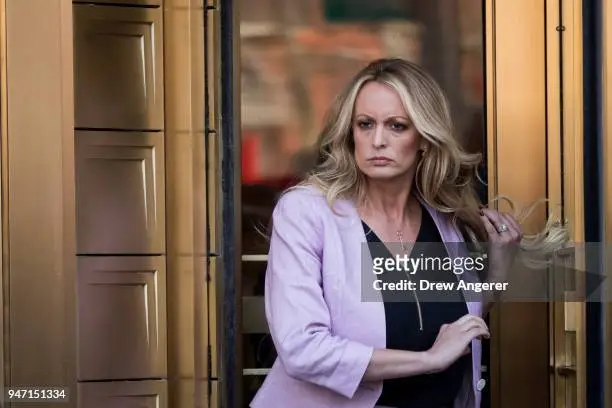Stormy Daniels took the witness stand on Tuesday at Donald Trump’s New York criminal trial, where she detailed a sexual encounter she claims to have had with him in 2006. She stated that she was paid to keep silent about the alleged incident during the 2016 presidential race. Daniels’ testimony provided jurors with a vivid and sometimes graphic account of an encounter that Trump has consistently denied. During her testimony, jurors appeared captivated as Daniels described the encounter, while Trump, seated in the courtroom, maintained a serious demeanor, occasionally exchanging whispers with his legal team.
The highly anticipated testimony of Daniels was a focal point in a trial that has featured a mix of tabloid-like elements and legal intricacies. Despite objections from the defense, Daniels was permitted to testify. At one point, the defense even requested a mistrial, arguing that her testimony was prejudicial and irrelevant. However, the judge denied the request, allowing Daniels’ statements to stand.
Daniels’ testimony is crucial to the case, particularly regarding the $130,000 payment made to her by Trump’s former lawyer and fixer, Michael Cohen, to keep quiet about the encounter. Trump faces 34 felony counts related to falsifying business records in connection with the payment.
During her testimony, Daniels described how her interaction with Trump began at a golf tournament, where they discussed the adult film industry. This conversation eventually led to a “brief” sexual encounter, according to Daniels, which she said Trump initiated after inviting her to dinner and then back to his hotel suite. Despite not feeling physically or verbally threatened, Daniels noted an imbalance of power, as Trump was larger and blocking her way.
Following multiple discussions with the judge and Trump’s legal team, prosecutor Susan Hoffinger guided Daniels’ testimony, instructing her to keep her answers brief and factual. The judge also intervened, at times striking Daniels’ answers from the official court record when they veered into unnecessary detail.
Daniels testified that she accepted Trump’s dinner invitation to avoid a planned dinner with colleagues. Her then-publicist suggested that accepting Trump’s invitation could be a strategic career move. Daniels also recounted how Cohen paid her after learning that she was considering making on-the-record statements about the encounter. Cohen was alerted to this by National Enquirer editor Dylan Howard, who was directed by publisher David Pecker to inform Cohen of Daniels’ intentions.
The trial continues to garner significant attention, not only for its legal implications for Trump but also for the spectacle surrounding Daniels’ testimony and the broader implications for the presidency.

